HeadlinesSeptember 30, 2021
As Government Shutdown Looms, Biden’s Legislative Agenda Hangs in the Balance
Lawmakers in both the House and Senate will vote today on a short-term spending bill that would fund the government into early December, in a last-minute bid to avert a disastrous government shutdown before a midnight deadline. The vote comes as Democratic leaders struggle to pass two major pieces of legislation: a $1 trillion infrastructure bill and the Build Back Better Act, a $3.5 trillion, 10-year package that would expand the social safety net and combat climate change. On Wednesday, House Speaker Nancy Pelosi and Senate Majority Leader Chuck Schumer huddled with President Biden in the Oval Office, as fractures within the Democratic Party threatened to derail Biden’s legislative agenda.
Meanwhile, House Democrats have narrowly approved a bill to suspend the ceiling on the national debt until the end of 2022. The Treasury Department warns that without congressional action, the U.S. will begin defaulting on its debts in mid-October. House Speaker Nancy Pelosi said Wednesday the consequences would be catastrophic.
Speaker Nancy Pelosi: “The nonpartisan Moody’s Analytics found that these consequences could include a loss of 6 million jobs, the elimination of potentially $15 trillion in household wealth, sending the unemployment rate surging to 9% and a decline in the real GDP of our country by 4%.”
After headlines, we’ll speak with Rev. William Barber, co-chair of the Poor People’s Campaign.
Second Alaska Hospital to Ration Care Amid Surge in Unvaccinated COVID Patients
The United States reported nearly 2,500 COVID-19 deaths on Wednesday, even as hospitalizations and new cases edged down from a peak in early September. Alaska is the hardest-hit state, with some of the highest infection rates in the world. On Wednesday, a hospital in Bethel became the second Alaska hospital to begin rationing care due to a surge in unvaccinated COVID-19 patients.
YouTube to Ban Anti-Vaccine Misinformation
YouTube said Wednesday it will ban all content claiming that government-approved vaccines do not work or are harmful. YouTube’s crackdown will target not only COVID-19 misinformation but also anti-vaccine content about other immunizations, like for measles or hepatitis.
CDC Urges Pregnant People to Get Vaccinated
The Centers for Disease Control and Prevention is urgently recommending pregnant people get vaccinated, warning less than a third of expectant people have received a COVID-19 shot. Among African Americans, that rate is even lower: less than 16%. Pregnant people are at much higher risk of hospitalization, mechanical ventilation and death from COVID-19, and the disease raises the risk of stillbirth, preterm birth and other complications.
Protesters Target Moderna CEO and Top Biden Aide, Demanding Vaccine Equity
In Maryland, public health activists staged a protest outside the home of White House Chief of Staff Ron Klain Wednesday, calling on the Biden administration to massively ramp up vaccine production and to transfer vaccine technology to the Global South. Activists placed a towering pile of fake human bones across from Klain’s home, representing millions of COVID-19 deaths. The protest was led by James Krellenstein, co-founder of the HIV/AIDS activist group PrEP4All.
James Krellenstein: “The millions of deaths that have occurred under this presidency’s watch, they are all preventable deaths. This is no longer a scientific crisis. This is a political crisis. And we are bringing these bones to this chief of staff’s house because this is not just a political issue. This is a personal is sue to tens of millions of people, to hundreds of millions, to billions of people around the world whose lives are threatened by this man and by this president’s inaction.”
In Massachusetts, over a dozen doctors linked to Harvard Medical School held a similar protest outside the Boston home of Moderna CEO Stéphane Bancel, demanding his company share the recipe for its COVID-19 vaccine with the world. Bancel’s net worth has soared to over $13 billion during the pandemic.
University of Washington researchers estimate more than 10.5 million people have died of COVID-19 worldwide, with projections that number will exceed 12.3 million by the end of the year. Only 2% of people in low-income nations have received even a single dose of a COVID vaccine.
U.N. Warns Tigray Blockade Leading to Famine, Dire Medical Shortages for Millions
The United Nations is demanding urgent action to prevent famine in Ethiopia’s rebel-held Tigray region. U.N. humanitarian chief Martin Griffiths called on Ethiopia’s government to end a de facto blockade of food, medical supplies and fuel into Tigray, calling the crisis a “stain on our consciousness.” A U.N. spokesperson said the crisis is affecting millions of people.
Stéphane Dujarric: “5.2 million people still require food aid, with 400,000 people living in famine-like conditions. Our humanitarian colleagues say that child malnutrition is at the same level as at the outset of the 2011 Somalia famine.”
Pentagon Knew U.S. Drone Strike in Kabul Missed Target, Hit Civilians Weeks Before Public Admission
Top military commanders were questioned by lawmakers again Wednesday on the U.S. withdrawal from Afghanistan. General Kenneth McKenzie, head of U.S. Central Command, said they were aware within just hours that the August 29 drone strike in Kabul had hit civilians, and knew a few days later that the target was a “mistake.” But it took the Pentagon weeks to admit this, after initially asserting the strike prevented an imminent threat by ISIS-K fighters. Investigations quickly revealed the victims were instead aid worker Zemari Ahmadi and his family members, including seven children. Zemari Ahmadi’s boss at the California-based nonprofit Nutrition and Education International has said the U.S. is still labeling the organization as an ISIS safe house, putting even more civilian lives at risk.
Ecuador Prison Riot Claims 116 Lives
North Korea Says It Tested New Hypersonic Missile
North Korea said it tested a new hypersonic missile this week. Hypersonic missiles are designed to defend against ballistic missiles and can potentially be fitted with a nuclear warhead. The U.N. Security Council is holding a meeting today on North Korea’s recent weapons tests. Meanwhile, North Korean leader Kim Jong-un said he is open to restoring an inter-Korean hotline.
La Palma Residents Lock Down as Volcano Lava Reaches Atlantic Ocean
In the Canary Islands, emergency crews are warning residents of the Spanish island of La Palma to seal their doors and windows, after lava from a volcanic eruption reached the Atlantic Ocean, raising fears of toxic gas clouds. So far no injuries have been reported, but over 6,000 people have been forced to evacuate.
House Cmte. Subpoenas Organizers of Jan. 6 Rallies, Incl. Trump Campaign Spokesperson
The House select committee probing the January 6 insurrection has issued subpoenas to 11 organizers of pro-Trump rallies that preceded the attack on the U.S. Capitol. Among those subpoenaed is Katrina Pierson, who served as a Trump campaign spokesperson in 2016. Pierson joined an Oval Office meeting with President Trump two days before the Capitol riot.
Baby Food Makers Kept Selling Products with Arsenic Levels Exceeding FDA-Approved Limits
Baby food manufacturers allowed products contaminated with heavy metals to remain on store shelves — even after dangerous levels of the toxic chemicals were detected in their products. That’s according to a new congressional report released Wednesday, which found baby food makers Gerber and Beech-Nut failed to recall infant rice cereals tested to have arsenic levels above FDA limits.
Land Defenders Vow to Continue Struggle as Enbridge Announces Oil Will Start Flowing Through Line 3
In Minnesota, Canadian pipeline company Enbridge said construction on the contested Line 3 crude oil pipeline is complete and oil will start flowing as early as Friday. Indigenous leaders and land and water defenders, who have been resisting Line 3 for years, often putting their own bodies on the line, vowed to continue the fight against the pipeline. Line 3 is set to carry over half a million barrels of tar sands every day, threatening local waters and lands, and doubling Minnesota’s greenhouse gas emissions.
Meanwhile, environmental activists celebrated the cancellation of the fracked gas PennEast pipeline earlier this week. Local residents, officials and advocates in New Jersey and Pennsylvania led a years-long battle against the project.
Canadian Judge Ends Injunction That Led to Violent Crackdown on Indigenous Fairy Creek Activists
In Canada, a judge has ended an injunction granted to logging company Teal-Jones, which the court says was used to crack down on activists at the Fairy Creek watershed blockade in a way that violated their civil liberties and infringed on press freedom. Police have arrested over 1,000 land defenders, often violently, as they fight to protect the remaining trees in Vancouver Island’s ancient forests. The First Nations-led protest is Canada’s largest act of civil disobedience. Click here to see our coverage of this issue
Wet’suwet’en Land Protectors Set Up Blockades Against Incursion by Coastal GasLink
On Wet’suwet’en territory, the Gidimt’en clan has set up new blockades to prevent Coastal GasLink from drilling on Indigenous land to build their pipeline. Earlier this week, Canadian police arrested protesters at the Beaver Dam blockade. This is a federal officer confronting an activist who had locked themselves to a bus.
Federal officer 1: “Using pain compliance.”
Land defender: “Serve and protect.”
Federal officer 1: “This can’t be comfortable for you, buddy.”
Federal officer 2: “You’ve put yourself and others in danger by being underneath a bus.”
Land defender: “Ow! Ow! Ow! Ow!”
Federal officer 2: “Let go!”
Land defender: “Ow!”
Federal officer 2: “Let go!”
Land defender: “Ow! My leg!”
Police eventually called in Coastal GasLink workers to physically cut the protester out of the bus.
Right Livelihood Award Goes to Environmental Activists, Rights Defenders Across the Globe
The winners for this year’s Right Livelihood Awards have been announced. The prize is often referred to as the “Alternative Nobel Prize.” Unis’to’ten land defender Freda Huson was recognized “for her fearless dedication to reclaiming her people’s culture and defending their land against disastrous pipeline projects.”
Freda Huson: “We have likely only 10% of our traditional territory remaining, is the reason why we were fighting so hard to protect that last 10%, so that we can continue to have clean water, continue to have salmon, continue to hunt our moose, eat the berries, collect the medicines, because that’s who we are as Unist’ot’en, as Wet’suwet’en. The land sustains us. And if we don’t take care of the land, then we won’t be able to sustain ourselves.”
The other award recipients are Marthe Wandou, Cameroonian peace activist fighting against sexual violence against women and girls; Russian environmental leader Vladimir Slivyak, who has taken on the coal and nuclear industries; and the organization Legal Initiative for Forest and Environment, or LIFE, which empowers communities in India to protect their resources in the pursuit of environmental democracy.
Most popular
- 1
- 2
- 3
- 4
Non-commercial news needs your support
Please do your part today.

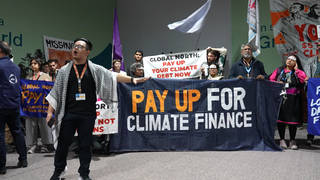
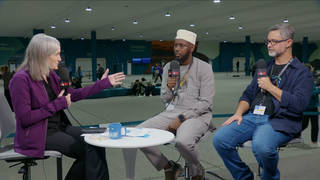
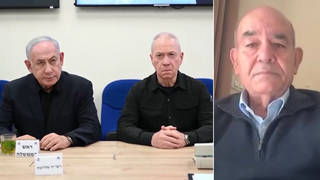
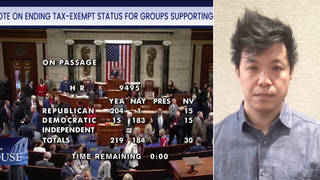





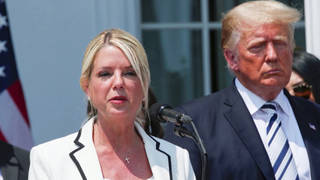
Media Options